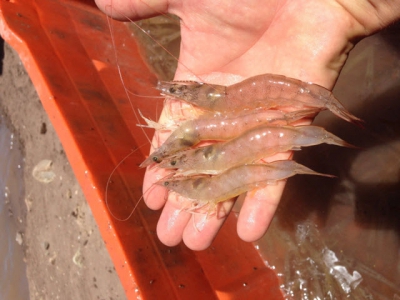Plant-based dietary supplements yield positive results in shrimp

New research demonstrates that Pacific white leg shrimp fed low fishmeal diets supplemented with a plant-based additive had comparable growth and immune responses to shrimp fed a high fishmeal diet.
Fishmeal is a major component in formulated feeds for Pacific white leg shrimp. Photo © Kurt Servin
In a recent study in Fish and Shellfish Immunology, researchers explored the growth rates and immune responses of Pacific white leg shrimp fed differing diets. Preliminary results indicate that shrimp fed a low fishmeal diet supplemented with a plant-based (phytogenic) product showed similar growth rates, nutritional performance and immune responses to shrimp fed high fishmeal diets. These results suggest that phytogenic supplementation can be incorporated into low fishmeal diets to compensate for the reduced performance associated with partially replacing fishmeal with other protein sources.
Fishmeal is a key ingredient in formulated aquaculture feeds. It is nutritionally dense, has a high protein content and is easily digestible. However, using and producing fishmeal has economic and ecological drawbacks. High quality fishmeal is expensive and creating the product can deplete wild fish stocks. Though alternatives to fishmeal are on the market, these products yield poorer results in terms of performance and health outcomes when compared to traditional fishmeal.
In this study, researchers assessed the effects of the commercial feed additive Digestarom PEP MGE on the growth, immune response and nutritional performance of white let shrimp, Litopenaeus vannamei. The researchers split a group of 540 juvenile shrimp into four cohorts and fed them four different diets for 63 days. The control group was fed a standard fishmeal formulation, and the experimental groups were fed a low fishmeal diet, a low fishmeal diet with a small dose of the phytogenic additive and a low fishmeal diet with a higher dose of the additive.
After 63 days, results showed that the feed additive compensated for the negative performance and health consequences of the low fishmeal diets. The shrimp fed the feed additive and low fishmeal diet showed similar survival rates, feed conversion ratios and hemocyte counts when compared to shrimp in the high fishmeal cohort.
This would suggest that the additive, Digestarom PEP MGE, can be included into low fishmeal diets fed to shrimp. The phytogenic supplementation can offset the negative performance and immunological effects of reducing the concentration of fishmeal in shrimp diets.
Có thể bạn quan tâm
 Support fish farmers with smart system
Support fish farmers with smart system The“Smart system for fish ponds” by Châu Thế Khanh and Lý Minh Mẫn, students of Võ Thị Sáu Secondary School in Châu Thành A district is unique for its
 Getting to grips with octopus farming’s ethical issues
Getting to grips with octopus farming’s ethical issues With demand rising globally, octopus farming is developing apace – but, mindful of both the animals’ welfare and concerns around sustainability
 This Spirulina is Straight from the Farm and Ready for Your Smoothies
This Spirulina is Straight from the Farm and Ready for Your Smoothies It’s been a cold and rainy fall in San Miguel de Allende in central Mexico. Ten miles out of town, in the mesquite-covered campo next to the Rio Laja, Francisco